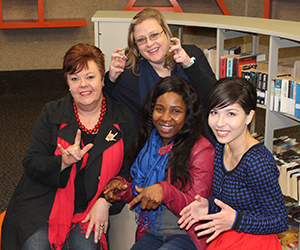Latest News Archive
Please select Category, Year, and then Month to display items
07 March 2024
Photo Lunga Luthuli
 Prof Francois Strydom, Senior Director at the Centre for Teaching and Learning and Simphiwe Kunene, the first African DREAM scholar and a master’s student from the Faculty of Education.
Prof Francois Strydom, Senior Director at the Centre for Teaching and Learning and Simphiwe Kunene, the first African DREAM scholar and a master’s student from the Faculty of Education.
The University of the Free State (UFS) received recognition for its commitment to student success at the 2024 Achieving the Dream (ATD) conference which celebrated its 20-year anniversary. Simphiwe Kunene, an Education master's student originally from the Qwaqwa campus, was selected to represent South Africa as the first DREAM scholar from Africa as part of the conference.
The Achieving the Dream network of over 300 institutions, which is one of the largest movements in US higher education aims to transform colleges and universities so that students of colour and a lower socio-economic status are supported to earn a degree. The UFS is a leading partner in the Siyaphumelela Network, which has been working for 10 years with ATD to enhance the success of students in South Africa. Prof Francois Strydom, Senior Director at the Centre of Teaching and Learning (CTL), accepted the award on behalf of the institution.
Prof Strydom said that collaboration with the ATD and Siyaphumelela institutions has helped the UFS to develop cutting-edge approaches to “level the playing field” and support Kovsies to earn their undergraduate degrees.
The first African DREAM scholar
Kunene was selected as the first African DREAM scholar from the Siyaphumelela network. To select the DREAM scholar, each Siyaphumelela partner institution nominated one student as a preferred candidate. From the proposed candidates, the DREAM scholar was selected by the South African Institute for Distance Education (Saide) based on the following: demonstrating resilience, academic excellence, and a deep commitment to making a positive difference in universities and personal communities.
He addressed the conference of over 2 000 delegates and shared with them his hopes and dreams. Many members of the South African delegation said Simphiwe did his country proud. He had the following to say about his opportunity to be a DREAM scholar: “Being a DREAM scholar was life changing for me, exposing me to an array of opportunities I never knew were possible and available for me. It was as if, for a moment, the world had stopped to just listen to what I had to say."
The way forward
The UFS will continue its work as a partner of the Siyaphumelela network for the 2024-2026 cycle. The multi-stakeholder project team is focused on enhancing undergraduate students’ time, and to position the UFS as a thought and research leader in the area of student success as part of Vision 130.
Largest group on African continent introduced to Sign Language
2016-07-05
 The introduction of basic Sign Language
The introduction of basic Sign Language
as part of the UFS101 course was a great
success. From left are Susan Lombaard,
Annemarie le Roux, Tshisikhawe Dzivhani
(all from the Department of South African
Sign Language), and Lauren Oosthuizen
(UFS101). Photo: Leonie Bolleurs
As a result of a new initiative at the University of the Free State (UFS), the largest group of students on the African continent took part in a first-year seminar which included Sign Language.
A total of 5400 students on the Bloemfontein Campus and 1000 on Qwaqwa Campus were taught basic Sign Language by Susan Lombaard, Acting Head of the Department of South African Sign Language, and her team members, Tshisikhawe Dzivhani, Annemarie le Roux, and Nicolene de Klerk.
It forms part of the UFS101 module presented to all first-year students. The initiative, begun in the first semester of 2016, will form part of UFS101 in future and was met with an overwhelmingly positive response.
Three segments of course
Sign Language was taught in three segments and positioned as large-class learning experiences in the Callie Human Centre (Bloemfontein Campus) and the Nelson Mandela Hall (Qwaqwa Campus). Students were taught about deaf culture, Sign Language theory, as well as how to sign their names, exchange pleasantries, and have a basic conversation.
A valuable skill to have
“It (the Sign Language experience) was very interesting and helpful,” said one of the students. “It is important to have the ability to communicate with all sorts of people, and to be able to help them in a crisis”. According to another, it sparked an interest in Sign Language. “It is a skill I will continue to use and try to learn more from it,” said a third.
Lombaard – in collaboration with the UFS101 team – will be presenting a paper related to this achievement at the DeafNet Africa Conference in Johannesburg, from 26 to 30 September 2016.